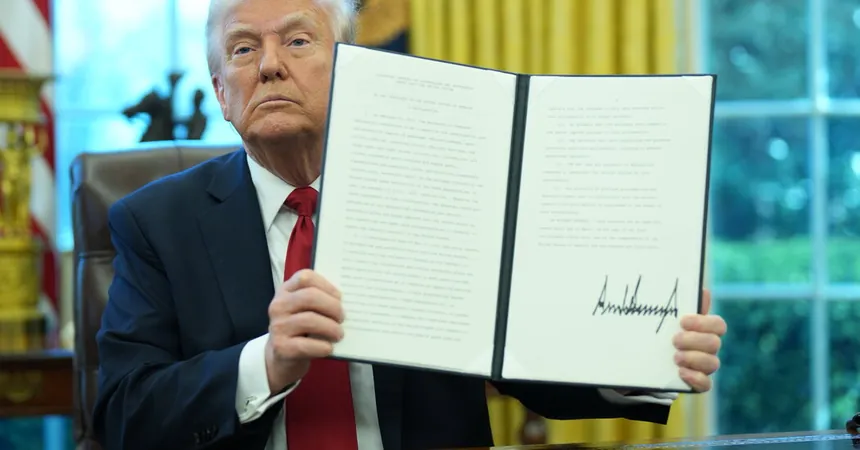
Shocking Trump Tariff Announcement: 25% on Imported Cars and Parts! What You Need to Know!
2025-03-26
Author: Ming
In a bold and controversial move, President Trump has announced a staggering 25 percent tariff on imported cars and parts, a decision that is already sending shockwaves through the automotive industry. This tariff will have profound implications, as nearly half of all vehicles sold in the United States and about 60 percent of parts in domestically assembled vehicles come from overseas.
During his address from the Oval Office, Trump described the tariffs as “very exciting,” claiming that the measure aims to encourage manufacturers to establish more factories within U.S. borders. “Anyone who has plants in the United States will benefit,” he declared.
However, industry experts are warning that the tariffs could significantly disrupt supply chains, reduce investments, and add thousands of dollars to consumer prices. Autos Drive America, which represents international automakers operating in the U.S., cautioned that these tariffs would lead to increased production and sales costs, ultimately affecting consumers through higher prices and fewer choices.
The Backlash: Global Trade Tension Intensifies!
The announcement has triggered an immediate backlash from various stakeholders, particularly from countries that export cars to the U.S., such as Canada, Japan, and several European nations. Canadian Prime Minister Mark Carney lamented, “This will hurt us,” signaling the potential for retaliation against American goods.
In response, Ontario's Premier Doug Ford issued a stern warning, stating, “We’re going to make sure we inflict as much pain as possible on the American people.” This hostile sentiment underscores a growing urgency for affected nations to retaliate against U.S. tariffs.
The prospect of escalating trade tensions is further highlighted by the immediate market reactions, with stock prices of major automakers plummeting. Companies like Ford and General Motors saw significant post-market declines, demonstrating investor concern over the potential fallout from the tariffs.
Europe Faces Significant Hits: The Economic Ripple Effect!
The impact of these tariffs will be especially pronounced in Europe, where automakers exported over $41 billion worth of cars to the U.S. last year. German manufacturers like Volkswagen, BMW, and Mercedes-Benz, which heavily rely on American sales, are bracing for a wave of challenges. BMW has warned that trade tensions could cost them up to $1 billion this year alone, underscoring the high stakes involved in this trade battle.
Ursula von der Leyen, the president of the European Commission, expressed her regret over the U.S. decision, stating that Europe would carefully assess the situation and explore measures to protect its economic interests. As the U.S. is the largest export market for EU cars, accounting for nearly 25% of exported vehicles, the stakes are too high for Europe to ignore.
Looking Ahead: What's Next in the Trade War?
In addition to the auto tariffs, the Trump administration is preparing to introduce what they term "reciprocal" tariffs aimed at equalizing trade practices between the U.S. and other nations. These tariffs could reach double digits, potentially exceeding 20%, a move that has raised alarms among economists and trade officials.
As the situation evolves, both sides are urged to seek negotiated solutions to avoid a protracted trade war that could further destabilize the global economy. With ongoing political discussions and negotiations, the coming weeks will be crucial in determining the future of transatlantic trade relations.
In summary, while the 25% tariff might be viewed as a step towards bolstering American manufacturing, it raises critical questions about trade competitiveness, market pricing, and international relations. Stay tuned as we continue to monitor this developing story and its economic implications!



 Brasil (PT)
Brasil (PT)
 Canada (EN)
Canada (EN)
 Chile (ES)
Chile (ES)
 Česko (CS)
Česko (CS)
 대한민국 (KO)
대한민국 (KO)
 España (ES)
España (ES)
 France (FR)
France (FR)
 Hong Kong (EN)
Hong Kong (EN)
 Italia (IT)
Italia (IT)
 日本 (JA)
日本 (JA)
 Magyarország (HU)
Magyarország (HU)
 Norge (NO)
Norge (NO)
 Polska (PL)
Polska (PL)
 Schweiz (DE)
Schweiz (DE)
 Singapore (EN)
Singapore (EN)
 Sverige (SV)
Sverige (SV)
 Suomi (FI)
Suomi (FI)
 Türkiye (TR)
Türkiye (TR)
 الإمارات العربية المتحدة (AR)
الإمارات العربية المتحدة (AR)